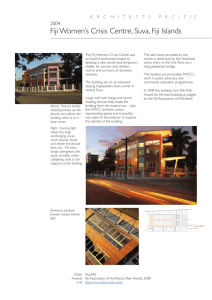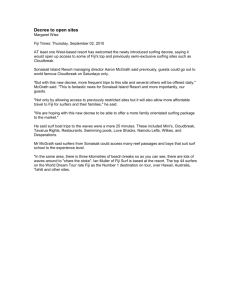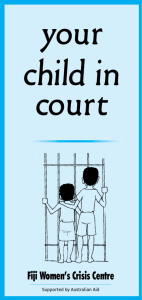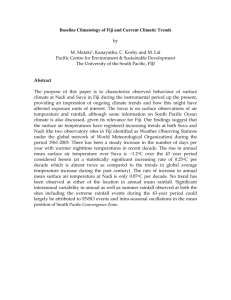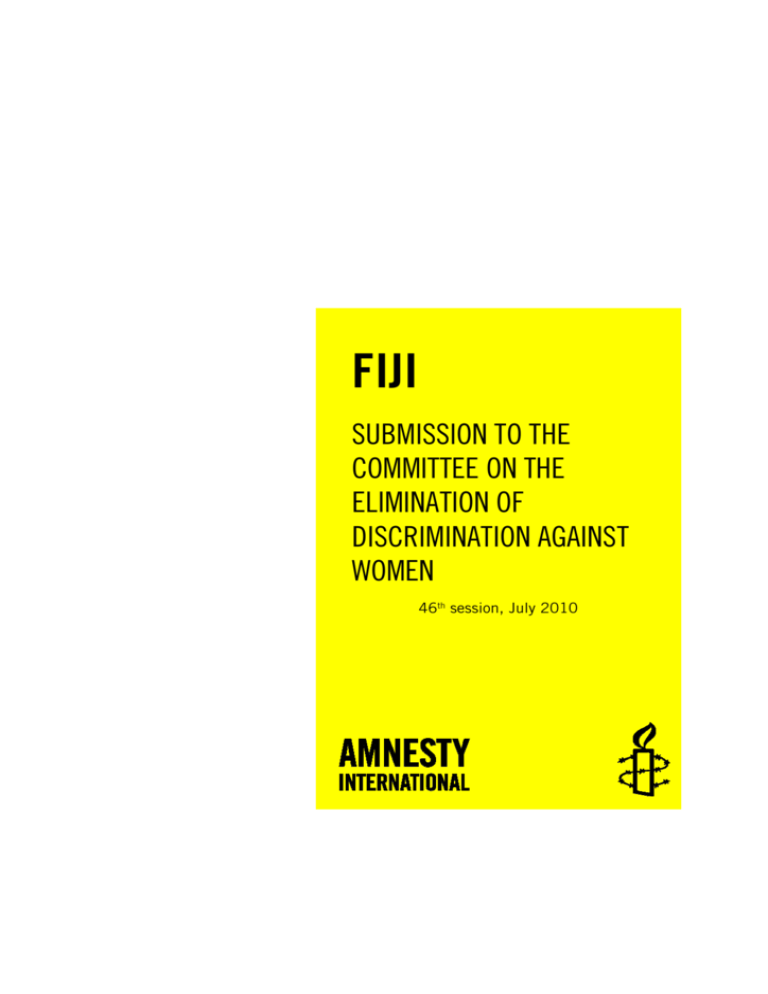
FIJI
SUBMISSION TO THE
COMMITTEE ON THE
ELIMINATION OF
DISCRIMINATION AGAINST
WOMEN
46th session, July 2010
Amnesty International Publications
First published in 2010by
Amnesty International Publications
International Secretariat
Peter Benenson House
1 Easton Street
London WC1X 0DW
United Kingdom
www.amnesty.org
Copyright Amnesty International Publications 2010
Index: ASA 18/003/2010
Original Language: English
Printed by Amnesty International, International Secretariat, United Kingdom
All rights reserved. No part of this publication may be reproduced, stored in a retrieval system, or transmitted, in any form
or by any means, electronic, mechanical, photocopying, recording or otherwise without the prior permission of the
publishers.
Amnesty International is a global movement of 2.2 million
people in more than 150 countries and territories, who
campaign on human rights. Our vision is for every person to
enjoy all the rights enshrined in the Universal Declaration of
Human Rights and other international human rights
instruments. We research, campaign, advocate and mobilize
to end abuses of human rights. Amnesty International is
independent of any government, political ideology, economic
interest or religion. Our work is largely financed by
contributions from our membership and donations
CONTENTS
Introduction .................................................................................................................5
1.
Background: Human Rights Developments in Fiji, 2006-2010 .............................6
2.1 Violence against women’s rights activists and sex workers, including torture and illtreatment, perpetrated by the Republic of Fiji Military Forces (Article 1, as interpreted by
General Recommendation 19) .................................................................................7
2.2 Violence against sex workers, including torture and ill-treatment, committed by Fiji
National Police.......................................................................................................8
3. Failure to introduce and enforce legislation that prohibits all forms of gender-based
violence, and failure to introduce other effective measures to prevent gender-based
violence (Articles 1, 2 and 3, as interpreted by General Recommendation 19) .................9
3.1 Need for the implementation of legislation to protect women against all forms of
gender-based violence (Articles 2 and 3) ..................................................................9
3.2 Capacity Building of Judicial officers on gender-based violence and women’s rights
(Article 1, as interpreted by General Recommendation 19; the requirement to eradicate
gender stereotyping Article 2(d) and 2(e) and Article 5(a))........................................11
4. Use of cultural practices that are demeaning to women (Articles 1, 2, 5 and 16) .......11
4.1 Use of the bulubulu........................................................................................12
4.2 Gender stereotypes and discrimination (Article 1, interpreted by General
Recommendation 19, and Article 5).......................................................................12
4.3 Forced reconciliation of victims of violence by the police (Articles 2 and 16) ........13
5. Recommendations to the government of Fiji ...........................................................14
5.1 With respect to gender discrimination and law reform, the Government of Fiji
should:................................................................................................................14
5.2 With respect to adopting measures to eradicate gender-based violence, the
Government of Fiji should: ....................................................................................14
5.3 With respect to the need for capacity building for judicial, prosecution, court,
police officials and those who respond to female survivors: .......................................14
Briefing to the Committee on the Elimination of Discrimination Against Women:
Violence against Women in Fiji
5
FIJI
BRIEFING TO THE UN COMMITTEE ON
THE ELIMINATION OF
DISCRIMINATION AGAINST WOMEN:
VIOLENCE AGAINST WOMEN
INTRODUCTION
Amnesty International submits the following information for consideration by the
Committee on the Elimination of Discrimination against Women (the Committee) in
advance of its consideration of Fiji’s Second, Third and Fourth Periodic Reports.
The briefing identifies issues that have arisen from Amnesty International’s recent
work on Fiji and which, in the view of Amnesty International, raise concerns about
Fiji’s compliance with its obligations under the Convention on the Elimination of All
Forms of Discrimination against Women (the Convention).
This briefing does not reflect the full range of concerns of the organization in terms
of respect, protection and fulfilment of women’s rights in Fiji, but looks primarily at
the pervasiveness of gender-based violence in the country.
Specifically, this briefing highlights Amnesty International’s concerns regarding the
failure of the State to meet its obligation to prevent, investigate and prosecute
gender-based violence against women and to ensure the provision of reparations.
These concerns include:
violence against women rights activists perpetrated by the Republic of Fiji
Military Forces (Article 1, as interpreted by General Recommendation 19);
violence against women sex workers perpetrated by the Fiji Police Force (Article
1, as interpreted by General Recommendation 19);
failure to introduce and enforce legislation that prohibits all forms of genderbased violence, and to introduce other effective measures to prevent gender-based
violence (Articles 1, 2 and 3, as interpreted by General Recommendation 19);
the prevalence of cultural practices that are demeaning to women (Articles 1, 2,
5 and 16).
Index: ASA 18/003/2010
Amnesty International June 2010
Briefing to the Committee on the Elimination of Discrimination Against Women:
Violence against Women in Fiji
6
1. BACKGROUND: HUMAN RIGHTS DEVELOPMENTS IN FIJI, 2006-2010
Since the December 2006 coup d’état and the appointment of a military-controlled
government, with Frank Bainimarama as both commander of the army and prime
minister, the military had been encroaching on Fiji’s political and administrative
system, including on the independence of judges and lawyers. In the process, a
wide array of human rights have been violated. With the April 2009 abrogation of
the Constitution and the declaration of emergency, Commodore Frank Bainimarama
and the military council consolidated their virtually absolute power in Fiji.
Previously parliament had effectively been abolished with the deposing of the
Laisenia Qarase government in December 2006.
Following the military takeover, Frank Bainimarama imposed a State of Emergency
(from December 2006 to May 2007) which suspended, amongst other things,
freedom of expression. Critics and media personnel including several newspaper
editors were threatened, warned and intimidated by the military. In February 2007,
the military admitted to taking more than 1,100 people to the military barracks,
where they were tortured or ill-treated, including being beaten; forced to perform
military type drills such as running; and being forced to carry heavy loads during
their runs. Letter writers to the daily newspapers were also detained, assaulted and
subjected to cruel, inhuman or degrading treatment during the State of Emergency
period.
Women’s rights activists in Fiji informed Amnesty International that from December
2006 to July 2007, there were hundreds of cases of detainees being subjected to
torture or other ill-treatment, such as being stripped naked and made to run around
a field or forced to touch each other’s private parts.1 Reports were provided to
Amnesty International by human rights groups based in Fiji, some of whom were
able to interview victims and other stakeholders about the human rights violations
by the military and have kept records of their interviews to be used as evidence in
future trials. Some of the victims that were interviewed were women who had been
subjected to violence and humiliating behaviour.
Following the decision of Fiji’s Court of Appeal on 9 April 2009 that the
government of Frank Bainimarama, appointed in the wake of the 2006 coup, was
unconstitutional, then President Ratu Josefa Iloilo announced in a 10 April 2009
nationally televised speech that he was taking over executive authority of the
government and abrogating the 1997 Constitution. He also announced that he was
revoking all judicial appointments, effectively sacking all members of the judiciary.
Furthermore, he stated that a new government was to be sworn in which would work
towards holding democratic elections in 2014.
After his 10 April announcement, the President immediately issued Public
Emergency Regulations effective for the next 30 days. These emergency regulations
1
Email and Amnesty International communication from Fiji based activists between December 2006 and
October 2008.
Amnesty International June 2010
Index: ASA 18/003/2010
Briefing to the Committee on the Elimination of Discrimination Against Women:
Violence against Women in Fiji
7
are still in place and have been constantly renewed through decrees enacted by the
cabinet, more than 12 months after the abrogation, and have been used to violate
the human rights of Fiji’s people.
The ongoing censorship of the media, interference with the judiciary and other
human rights violations perpetrated by the military and police have meant that
women in Fiji, already marginalised, have found it more difficult to enjoy their
rights, particularly when it comes to protection against violence and freedom of
expression. For instance, in 2009 during the Police Christian Crusades to address
crime, police officers often forced women victims to reconcile with their violent
husbands so that the marriage remained intact.
2 VIOLENCE AGAINST WOMEN PERPETRATED BY GOVERNMENT OFFICIALS
2.1 VIOLENCE PERPETRATED AGAINST WOMEN’S RIGHTS ACTIVISTS AND SEX WORKERS, INCLUDING
TORTURE AND ILL-TREATMENT, BY THE FIJIAN MILITARY (ARTICLE 1, AS INTERPRETED BY GENERAL
RECOMMENDATION 19)
Amnesty International interviewed a number of women’s rights activists who had
been threatened, assaulted or tortured by military officers during the height of the
military takeover in December 2006.2 Several others were threatened with rape or
other violence over the telephone by men who were later identified as having
connections with the Fijian military.3 Some of these women were also subjected to
beatings, kicks and punches, sexual abuse and other torture or ill-treatment.4 The
vast majority of the women who had suffered these abuses were too frightened to
complain to the police or to the Fiji Human Rights Commission (FHRC) because the
integrity of these institutions had been comprised due to close links with the
military. The Fiji Police Force is led by Commodore Esala Teleni, who had been the
Deputy Commander of the Military during the military takeover. The FHRC had lost
its local and international credibility when it publicly supported the military
takeover in January 2007.5 It was later suspended from the Asia Pacific Forum of
National Human Rights Institutions and the International Coordinating Committee
2
These interviews took place from April to September 2009.
3
See “Women Human Rights Defenders Threatened,” Women Human Rights Defenders International
Coalition website, 11 December 2006, http://www.defendingwomendefendingrights.org/fiji_whrd_threatened.php and “Fiji: Paradise Lost A tale of ongoing human rights
violations April – July 2009” Amnesty International 2009
http://www.amnesty.org/en/library/asset/ASA18/002/2009/en/0024be13-bdd1-47d2-875a863fff41f978/asa180022009en.pdf, both accessed 20 April 2010.
4
“Virisila Buadromo Carries On Fiji’s Warrior Tradition”, America.gov, 10 March 2008,
http://www.america.gov/st/hr-english/2008/March/20080310113546ajesrom0.4016687.html;
“Statement: Fiji: threats of reprisals for using UN Special Mechanisms” AWID women’s rights, 19
February 2010, http://www.awid.org/eng/Women-in-Action/Announcements2/Statement-Fiji-Threats-ofreprisal-for-using-UN-Special-Mechanisms.
5
www.fijitimes.com/extras/media/fhrcmediarpt2007.pdf, accessed 20 August 2009; “Forum Eminent
Persons’ Group Report Fiji 29 January – 1 February 2007”
http://archives.pireport.org/archive/2007/February/EPG_Report_2007.pdf, accessed 20 August 2009,
para 31, 48 [indicate loss of credibility of the FHRC].
Index: ASA 18/003/2010
Amnesty International June 2010
Briefing to the Committee on the Elimination of Discrimination Against Women:
Violence against Women in Fiji
8
of National Human Rights Institutions. Many of the victims also feared further
threats, assaults and victimization by the military officers who had been responsible
for their traumatic ordeals.6 To date there has been no prosecution of any member
of the military who had assaulted any of these women or otherwise violated their
rights.
A prominent human rights activist who was critical of the military’s assault on
members of the public, Angie Heffernan, was threatened with arrest and assault in
January 2007 and was forced into hiding from military officers. Other prominent
women activists were banned from leaving the country because of their criticism of
the interim government. Lawyer Tupou Draunidalo was barred from travelling to
Hong Kong to attend a conference in August 2007. Human rights activist Imrana
Jalal was also banned from travelling in September of that year. Shamima Ali,
prominent women’s rights activist and human rights commissioner, was also placed
on a travel ban for being an outspoken critic of the government. The travel bans
were later lifted.
2.2 VIOLENCE AGAINST SEX WORKERS, INCLUDING TORTURE AND ILL-TREATMENT, COMMITTED BY FIJI
NATIONAL POLICE
In 2009 the Police Commissioner teamed up with the New Methodist Church to run
Christian “crusades” in the urban centres as a means of combating crime. There
were reports that during such crusades, police arrested female sex workers who were
then forced to jump from bridges as punishment for ‘selling themselves’.7 There
were also reports of police assaulting and raping these sex workers. These
incidences continue to occur despite the fact that the Christian crusades were
stopped by the government at the end of 2009. Amnesty International spoke with
women’s rights activists who stated that the sex workers are afraid of being
victimised by members of the security forces if they lodge complaints against
them.8 Amnesty International is concerned about the impunity with which the
members of the security forces are targeting these already marginalised women for
torture and ill-treatment.
Amnesty International calls on the government of Fiji to put an immediate halt to
the targeting of women activists and women sex workers. The victims should be able
to ask for and access any protection they need so that they can safely complain to
6
“Fiji: Paradise Lost A tale of ongoing human rights violations April – July 2009” Amnesty International
2009, http://www.amnesty.org/en/library/asset/ASA18/002/2009/en/0024be13-bdd1-47d2-875a863fff41f978/asa180022009en.pdf, accessed 20 April 2010.
7
Amnesty International interview with women’s rights activist 01 February 2010. Also see “An unholy
alliance of church and state” Sydney Morning Herald, 29 November 2009,
http://www.smh.com.au/world/an-unholy-alliance-of-church-and-state-20091128-jxwu.html accessed 20
April 2010.
8
Amnesty International interview with women’s rights activist 01 February 2010. Also see “An unholy
alliance of church and state” Sydney Morning Herald, 29 November 2009,
http://www.smh.com.au/world/an-unholy-alliance-of-church-and-state-20091128-jxwu.html accessed 20
April 2010.
Amnesty International June 2010
Index: ASA 18/003/2010
Briefing to the Committee on the Elimination of Discrimination Against Women:
Violence against Women in Fiji
9
sympathetic and professional staff. The government of Fiji should undertake
prompt, effective, independent and impartial investigations, with the aim of
ensuring that perpetrators are brought to justice in proceedings which meet
international standards relating to fair trial. The government should also take steps
to ensure that victims receive medical and psychological services, and the full range
of reparation, including compensation and guarantees of non-repetition.
3 FAILURE TO INTRODUCE AND ENFORCE LEGISLATION THAT PROHIBITS ALL
FORMS OF GENDER-BASED VIOLENCE, AND FAILURE TO INTRODUCE OTHER
EFFECTIVE MEASURES TO PREVENT GENDER-BASED VIOLENCE (ARTICLES 1, 2
AND 3, AS INTERPRETED BY GENERAL RECOMMENDATION 19)
3.1 NEED FOR THE IMPLEMENTATION OF LEGISLATION TO PROTECT WOMEN AGAINST ALL FORMS OF
GENDER-BASED VIOLENCE (ARTICLES 2 AND 3)
Amnesty International remains concerned of the continuing rise in reports of sexual
and other violence against women and girls in the country.9 Women’s rights activists
who work with survivors have raised their concern that the rates of incidences of
violence seem to be worse than previous years.10
The Fiji government enacted the Domestic Violence Decree on 14 August 2009.
This Decree was based on consultations by the Fiji Law Reform Commission with
women’s groups and other stakeholders in 2004. After its enactment, a number of
women’s groups in Fiji were critical of the fact that they were not included in the
consultations by the current government and that such a decree needs to be passed
by a lawfully elected government.
Amnesty International welcomes the enactment of a decree which aims to address
violence against women, reflecting the state’s acknowledgment, albeit indirectly, of
its obligations under the Convention to protect women from violence. However, the
organization is concerned that the full text has not been published11 and that
information is limited to what the government has made public through its media
statements.12 This lack of transparency raises questions about the extent of the
government’s commitments to eliminating violence against women.
9
“Rape case rise worries Fijian Police” Pacific Island Women United, 14 July 2009,
http://piwunited.wordpress.com/rape-case-rise-worries-fijian-police/, accessed 08 April 2010.
10
Amnesty International discussion with Fiji Women’s Rights Activists August 2009.
11
At the time of writing, this decree is still inaccessible to the public.
12
“Extraordinary” Fiji Sun, 11 June 2009, http://www.fijisun.com.fj/main_page/view.asp?id=29132,
“New Fiji decree augments court powers in domestic violence cases” Radio New Zealand International,
13 August 2009, http://www.rnzi.com/pages/news.php?op=read&id=48431; “‘Overwhelming and
extremely positive response to Domestic Violence Decree’ says Attorney General” Fiji Attorney-General’s
Chambers, 14 September 2009, http://webapps01.un.org/vawdatabase/uploads/Fiji%20%20Domestic%20Violence%20Decree%20PR%20(2009).pdf accessed 21 April 2010.
Index: ASA 18/003/2010
Amnesty International June 2010
Briefing to the Committee on the Elimination of Discrimination Against Women:
Violence against Women in Fiji
10
Based on the government’s public statements Amnesty International understands
that the Decree creates a new offence of domestic violence defined as any act of
violence committed in a family situation. The definition includes acts of violence
committed in both de facto and de jure relationships and any violence committed
against children. Courts are also to be given wide discretion to prevent domestic
violence, to take into account the “domestic” nature of an assault in granting or
refusing bail, and to issue restraining orders against the perpetrator to prevent
further assault.
As far as Amnesty International is aware, there have been no prosecutions under
this decree ten months after its enactment. All those currently charged with
domestic violence offences are prosecuted for assault-related charges under the
Crimes Decree, which came into force on 1 February 2010, and which have similar
provisions to the Penal Code (Cap 17) which has been repealed.13 The assault
provisions in the Crimes Decree do not provide specifically for violence against
women. Such violence could fall under common assault (section 274), which
carries a maximum sentence of one year imprisonment; assault occasioning actual
bodily harm (section 275) which carry a maximum of five years; acts intended to
cause grievous harm or prevent arrest (section 255), which carries a maximum
sentence of life imprisonment; or grievous harm, which carries a maximum sentence
of 15 years’ imprisonment (section 258). However, in practice persons charged with
physically attacking women are prosecuted under the lighter charges of common
assault and magistrates have often been lenient in passing sentences. In a report to
the United Nations Human rights Council, the Fiji Women’s Crisis Centre confirmed
that there were many cases in which magistrates often handed lenient sentences
such as six months or less or even suspended sentences in violence against women
cases.14 There are separate provisions in the Crimes Decree for rape and other
sexual offences (sections 206-233), as well as sexual offences under provisions for
crimes against humanity (sections 88-93, 102-110).
Amnesty International believes the government of Fiji must identify and address the
root causes of violence against women, in addition to ensuring that perpetrators are
prosecuted and that reparations are provided to survivors. Gender inequality and
discrimination is justified as being supported by customs or religion and must be
effectively addressed in all law and policies (discussed below). Moreover the
government must make the complete text of the Domestic Violence Decree public.
13
For the Crimes Decree see
http://www.fijilive.com/archive/showpdf.php?pdf=2010/02/Crimes%20Decree%202009.pdf; For the
Penal Code see http://www.itc.gov.fj/lawnet/fiji_act/penal_code.html.
14
“Fiji Women’s Crisis Centre Submission to the United Nations Periodic Review on Violence Against
Women: Fiji” Fiji Women’s Crisis Centre
http://lib.ohchr.org/HRBodies/UPR/Documents/Session7/FJ/FWCC_UPR_FJI_S07_2010_Fiji_WomensCris
isCentre.pdf accessed 02 May 2010.
Amnesty International June 2010
Index: ASA 18/003/2010
Briefing to the Committee on the Elimination of Discrimination Against Women:
Violence against Women in Fiji
11
3.2 CAPACITY BUILDING OF JUDICIAL OFFICERS ON GENDER-BASED VIOLENCE AND WOMEN’S RIGHTS
(ARTICLE 1, AS INTERPRETED BY GENERAL RECOMMENDATION 19; THE REQUIREMENT TO ERADICATE
GENDER STEREOTYPING ARTICLE 2(D) AND 2(E) AND ARTICLE 5(A))
Amnesty International is concerned that the judiciary in Fiji do not receive
sufficient training on how to implement women’s equality before the law in practice,
particularly in cases relating to violence against women.15 Whilst there has been
judicial training on gender and human rights for a number of years in the Pacific,
including Fiji, there are still reports of magistrates who are discriminatory in their
decisions and statements in court.16 In mid-2009, women’s groups in Fiji and the
region were outraged by the comments of (a then) recently recruited magistrate
during a hearing of a domestic violence case. Magistrate Elsie Hudson told the
victim she was not living in a utopia and should not expect a perfect husband. The
magistrate then reportedly asked: 'Which woman has not been slapped by her
husband?".17
In a rape case, the same magistrate, in dismissing the case, said that the victim
was probably hallucinating because she had provided conflicting statements and
that the victim should have bitten the perpetrator’s penis to enable her to escape.18
Amnesty International considers these types of comments by a magistrate as deeply
insensitive, demeaning and perpetuating gender stereotyping and violence. Women
often face many barriers to reporting cases of violence. Such comments by a judge
are unacceptable and the steps must be taken to ensure that they cease
immediately and that the attitudes which gave rise to them are addressed.
4 USE OF CULTURAL PRACTICES THAT ARE DEMEANING TO WOMEN (ARTICLES
1, 2, 5 AND 16)
Entrenched cultural, traditional and religious beliefs play a significant role in
shaping attitudes towards women and violence. They often determine how
community and religious leaders, police officers, court officials and members of the
public react to gender-based violence. There is generally a very patriarchal and
15
“Fiji country supplement”, supplement to “Violence against Women in Melanesia and East Timor”,
Ausaid http://www.ode.ausaid.gov.au/publications/pdf/vaw_cs_fiji.pdf, p 158.
16
Human rights and gender training for court, prosecution and police officials have been implemented
by the Fiji Women’s Rights Movement (FWRM), Fiji Women’s Crisis Centre (FWCC) and the Pacific
Regional Rights Resource Team (RRRT) for many years.
17
Fiji Women’s Crisis Centre Press Release 24 September 2009,
http://lyris.spc.int/read/attachment/66115/1/htmlversion.html accessed 19 April 2010.
18
Fiji Women’s Crisis Centre Press Release 24 September 2009,
http://lyris.spc.int/read/attachment/66115/1/htmlversion.html accessed 19 April 2010.
Index: ASA 18/003/2010
Amnesty International June 2010
Briefing to the Committee on the Elimination of Discrimination Against Women:
Violence against Women in Fiji
12
biased view among the general public against women in Fiji.
4.1 USE OF THE BULUBULU
Traditional forms of seeking forgiveness like the bulubulu have often been used by
perpetrators of violence to escape the full force of the law. This practice, where the
perpetrator’s family ask forgiveness from the victim’s family through the
presentation of the tabua, a whale’s tooth and other gifts, often takes the decision
of reporting a case of rape or violence away from the victim and into the extended
family. In cases of violence against women, evidence of the bulubulu being
presented (by the family of the accused and accepted by the victim’s family) can be
presented to the court as a mitigating factor. Courts have in some instances passed
a lighter sentence in such cases, including suspended sentences in lieu of
imprisonment.19 Further, under section 163 of the Criminal Procedure Code,
reconciliation is encouraged by judges and magistrates in relation to a number of
offences, including domestic violence.20 This provision in the Criminal Procedure
Code has not been repealed by the government.
Amnesty International is concerned at the use of the bulubulu as a mitigating factor
to lessen sentences, especially in cases of violence against women. This practice
betrays the women of Fiji who endure the violence and then see that crimes
committed against them are treated less seriously than assaults against men.
Perpetrators of violence know that through bulubulu they can get away with minimal
punishment. Such informal extrajudicial forms of settlement deny the victims
recognition of the gravity of the offence committed against her and foster a climate
of impunity for the perpetrators.
4.2 GENDER STEREOTYPES AND DISCRIMINATION (ARTICLE 1, INTERPRETED BY GENERAL
RECOMMENDATION 19, AND ARTICLE 5)
Gender stereotypes and discrimination are rife in Fiji. When men beat up their wives
or girlfriends, the authorities are often reluctant to arrest and charge them unless
there is pressure from the family of the victim or from women’s rights activists
providing advocacy and counselling support to the victim. Reluctance stems from
deeply held belief that a man has the right to beat his wife if he has what is
considered a justifiable reason to do so.21 The police in many instances do not
consider domestic violence as a criminal offence and see it instead as an internal
19
“Fiji country supplement”, supplement to “Violence against Women in Melanesia and East Timor”,
Ausaid http://www.ode.ausaid.gov.au/publications/pdf/vaw_cs_fiji.pdf page 158 accessed 16 April 2010.
20
Section 163 of the Penal Code Criminal Procedure Code provides :
163. “In the case of any charge or charges brought under any of the provisions of subsection (1) of
section 197 or of section 244 or of section 245 or of subsection (1) of section 324 of the Penal Code,
the court may, in such cases which are substantially of a personal or private nature and which are not
aggravated in degree promote reconciliation and encourage and facilitate the settlement in an amicable
way of the proceedings, on terms of payment of compensation or on other term approved by the court,
and may thereupon order the proceedings to be stayed or terminated.”
21
“Extraordinary” Fiji Sun, 11 June 2009, http://www.fijisun.com.fj/main_page/view.asp?id=29132
accessed 30 April 2010.
Amnesty International June 2010
Index: ASA 18/003/2010
Briefing to the Committee on the Elimination of Discrimination Against Women:
Violence against Women in Fiji
13
family matter that needs to be resolved by the parties themselves. These attitudes
of the police have often discouraged women from lodging complaints.
However gender and human rights training being implemented by a handful of
women’s NGOs in the country (like the Fiji Women’s Rights Movement and the Fiji
Women’s Crisis Centre) has gone some way in sensitizing police officers,
prosecutors and other officials on addressing their own biases in order to enforce
the law fairly.
4.3 FORCED RECONCILIATION OF VICTIMS OF VIOLENCE BY THE POLICE (ARTICLES 2 AND 16)
As mentioned above, in 2009 there were disturbing developments involving the
influence of the then state-supported New Methodist Church. The New Methodist
Church joined forces with the Fiji Police Force to undertake a Christian “crusade” to
combat crime in urban areas.22 Amnesty International was informed that the new
police approach to addressing domestic violence was to compel women survivors of
violence to reconcile with their violent husbands, with police and Methodist Church
personnel portraying this as the implementation of Christian principles of
maintaining the family unit.23 Many of these cases remain unreported because of
the widespread censorship of the media through the Public Emergency Regulations
(PER) in force since April 2009. Women’s rights activists who worked with survivors
of violence emphasised that in many cases police officers, often with the
encouragement of the New Methodist Church, advised women that the worst thing
they could do to their family and their future would be to leave a violent relationship
or press for prosecution of their partners in the courts.24 Amnesty International was
informed by activists providing counselling and advocacy services for women
survivors that in many cases where reconciliation was forced by the authorities, the
abuse often re-occurred almost instantly.25
Amnesty International is concerned that this overt failure to act on complaints by
victims of violence against women, supported by policy, has placed women at
severe risk of further violence, including increased levels of violence. Although the
Christian “crusade” policy was abandoned by the government at the end of 2009,
according to reports, the practice still continues.
22
“An unholy alliance of church and state” Sydney Morning Herald, 29 November 2009,
http://www.smh.com.au/world/an-unholy-alliance-of-church-and-state-20091128-jxwu.html, accessed 20
April 2010.
23
Amnesty International discussion with Fijian Women’s rights activist 02 April 2010.
24
Ibid
25
Ibid
Index: ASA 18/003/2010
Amnesty International June 2010
Briefing to the Committee on the Elimination of Discrimination Against Women:
Violence against Women in Fiji
14
5 RECOMMENDATIONS TO THE GOVERNMENT OF FIJI
5.1 WITH RESPECT TO GENDER DISCRIMINATION AND LAW REFORM, THE GOVERNMENT OF FIJI SHOULD:
Modify or repeal existing laws and regulations that discriminate against women
and girls in family or public life. The Domestic Violence Decree 2009 should be
made public and, if necessary, be amended to ensure full compliance with
international law in general and the Convention in particular.
Adopt measures, including legislation, to ensure that any customary laws and
practices identified as being inconsistent with the Convention and other human
rights treaties and standards are overturned and neutralised by the formal legal
system; and train officials and launch educational drives to ensure that
discriminatory practices are abolished.
Repeal all legal provisions and abolish judicial practices where “reconciliation”
between families of violent men and their wives or girlfriends is imposed on the
latter against their will. Immediate steps should be taken to follow up on cases
where women have been forced to “reconcile” with abusers, to make an immediate
assessment of risks, and take urgent steps to ensure their safety.
5.2 WITH RESPECT TO ADOPTING MEASURES TO ERADICATE GENDER-BASED VIOLENCE, THE
GOVERNMENT OF FIJI SHOULD:
Invite the UN Special Rapporteur on violence against women, its causes and
consequences to visit Fiji and to report on the adequacy of measures adopted by the
State to prevent, investigate and punish violence against women and girls and to
provide redress to victims
Ensure that the Government formulates and implements an effective plan for
preventing violence against women and girls. Responsibility for addressing violence
against women and girls should be assumed at the most senior political level. A
time-bound, well-resourced and coherent method of addressing gender-based
violence must be developed. All measures should be benchmarked and regularly
assessed to appraise their effectiveness.
Provide statistical information and analyses about how many complaints are
received, how they are investigated and the conviction rates of such cases.
Implement existing measures and, where necessary, develop new measures to
fill gaps that exist in protecting women and children from violence of all forms.
5.3 WITH RESPECT TO THE NEED FOR CAPACITY BUILDING FOR JUDICIAL, PROSECUTION, COURT, POLICE
OFFICIALS AND THOSE WHO RESPOND TO FEMALE SURVIVORS:
Government must implement specific training on gender and women’s rights as
a permanent requirement for all judges, magistrates, prosecutors, court officials and
police officers.
Amnesty International June 2010
Index: ASA 18/003/2010
Briefing to the Committee on the Elimination of Discrimination Against Women:
Violence against Women in Fiji
15
Ensure that healthcare professionals, welfare officers, counsellors and legal
advisors are given training in how to respond to female survivors of gender-based
violence in a manner which respects women’s human rights and ensures the safety
and welfare of the survivor. In particular, it should be impressed upon staff who
deal with female survivors of gender-based violence that they personally play an
important role in determining how women and girls perceive the violence they have
suffered and how they understand their options and rights with respect to obtaining
justice and redress.
The government should provide greater support for the work of women’s
organizations in Fiji (including by ensuring freedom of expression) such as the Fiji
Women’s Crisis Centre which have long been at the forefront of efforts to prevent
violence against women. They do essential work offering shelter, counselling and
legal advice to survivors of violence, with little or no support from the government
Index: ASA 18/003/2010
Amnesty International June 2010
Amnesty International
International Secretariat
Peter Benenson House
1 Easton Street
London WC1X 0DW
www.amnesty.org

